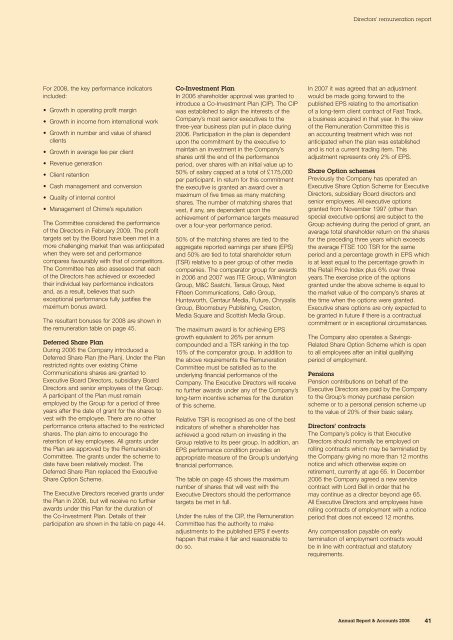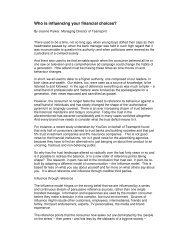Full-year - Chime Communications PLC
Full-year - Chime Communications PLC
Full-year - Chime Communications PLC
You also want an ePaper? Increase the reach of your titles
YUMPU automatically turns print PDFs into web optimized ePapers that Google loves.
Directors’ remuneration reportFor 2008, the key performance indicatorsincluded:• Growth in operating profit margin• Growth in income from international work• Growth in number and value of sharedclients• Growth in average fee per client• Revenue generation• Client retention• Cash management and conversion• Quality of internal control• Management of <strong>Chime</strong>’s reputationThe Committee considered the performanceof the Directors in February 2009. The profittargets set by the Board have been met in amore challenging market than was anticipatedwhen they were set and performancecompares favourably with that of competitors.The Committee has also assessed that eachof the Directors has achieved or exceededtheir individual key performance indicatorsand, as a result, believes that suchexceptional performance fully justifies themaximum bonus award.The resultant bonuses for 2008 are shown inthe remuneration table on page 45.Deferred Share PlanDuring 2006 the Company introduced aDeferred Share Plan (the Plan). Under the Planrestricted rights over existing <strong>Chime</strong><strong>Communications</strong> shares are granted toExecutive Board Directors, subsidiary BoardDirectors and senior employees of the Group.A participant of the Plan must remainemployed by the Group for a period of three<strong>year</strong>s after the date of grant for the shares tovest with the employee. There are no otherperformance criteria attached to the restrictedshares. The plan aims to encourage theretention of key employees. All grants underthe Plan are approved by the RemunerationCommittee. The grants under the scheme todate have been relatively modest. TheDeferred Share Plan replaced the ExecutiveShare Option Scheme.The Executive Directors received grants underthe Plan in 2006, but will receive no furtherawards under this Plan for the duration ofthe Co-Investment Plan. Details of theirparticipation are shown in the table on page 44.Co-Investment PlanIn 2006 shareholder approval was granted tointroduce a Co-Investment Plan (CIP). The CIPwas established to align the interests of theCompany’s most senior executives to thethree-<strong>year</strong> business plan put in place during2006. Participation in the plan is dependentupon the commitment by the executive tomaintain an investment in the Company’sshares until the end of the performanceperiod, over shares with an initial value up to50% of salary capped at a total of £175,000per participant. In return for this commitmentthe executive is granted an award over amaximum of five times as many matchingshares. The number of matching shares thatvest, if any, are dependent upon theachievement of performance targets measuredover a four-<strong>year</strong> performance period.50% of the matching shares are tied to theaggregate reported earnings per share (EPS)and 50% are tied to total shareholder return(TSR) relative to a peer group of other mediacompanies. The comparator group for awardsin 2006 and 2007 was ITE Group, WilmingtonGroup, M&C Saatchi, Tarsus Group, NextFifteen <strong>Communications</strong>, Cello Group,Huntsworth, Centaur Media, Future, ChrysalisGroup, Bloomsbury Publishing, Creston,Media Square and Scottish Media Group.The maximum award is for achieving EPSgrowth equivalent to 26% per annumcompounded and a TSR ranking in the top15% of the comparator group. In addition tothe above requirements the RemunerationCommittee must be satisfied as to theunderlying financial performance of theCompany. The Executive Directors will receiveno further awards under any of the Company’slong-term incentive schemes for the durationof this scheme.Relative TSR is recognised as one of the bestindicators of whether a shareholder hasachieved a good return on investing in theGroup relative to its peer group. In addition, anEPS performance condition provides anappropriate measure of the Group’s underlyingfinancial performance.The table on page 45 shows the maximumnumber of shares that will vest with theExecutive Directors should the performancetargets be met in full.Under the rules of the CIP, the RemunerationCommittee has the authority to makeadjustments to the published EPS if eventshappen that make it fair and reasonable todo so.In 2007 it was agreed that an adjustmentwould be made going forward to thepublished EPS relating to the amortisationof a long-term client contract of Fast Track,a business acquired in that <strong>year</strong>. In the viewof the Remuneration Committee this isan accounting treatment which was notanticipated when the plan was establishedand is not a current trading item. Thisadjustment represents only 2% of EPS.Share Option schemesPreviously the Company has operated anExecutive Share Option Scheme for ExecutiveDirectors, subsidiary Board directors andsenior employees. All executive optionsgranted from November 1997 (other thanspecial executive options) are subject to theGroup achieving during the period of grant, anaverage total shareholder return on the sharesfor the preceding three <strong>year</strong>s which exceedsthe average FTSE 100 TSR for the sameperiod and a percentage growth in EPS whichis at least equal to the percentage growth inthe Retail Price Index plus 6% over three<strong>year</strong>s.The exercise price of the optionsgranted under the above scheme is equal tothe market value of the company’s shares atthe time when the options were granted.Executive share options are only expected tobe granted in future if there is a contractualcommitment or in exceptional circumstances.The Company also operates a Savings-Related Share Option Scheme which is opento all employees after an initial qualifyingperiod of employment.PensionsPension contributions on behalf of theExecutive Directors are paid by the Companyto the Group’s money purchase pensionscheme or to a personal pension scheme upto the value of 20% of their basic salary.Directors’ contractsThe Company’s policy is that ExecutiveDirectors should normally be employed onrolling contracts which may be terminated bythe Company giving no more than 12 monthsnotice and which otherwise expire onretirement, currently at age 65. In December2006 the Company agreed a new servicecontract with Lord Bell in order that hemay continue as a director beyond age 65.All Executive Directors and employees haverolling contracts of employment with a noticeperiod that does not exceed 12 months.Any compensation payable on earlytermination of employment contracts wouldbe in line with contractual and statutoryrequirements.Annual Report & Accounts 2008 41









